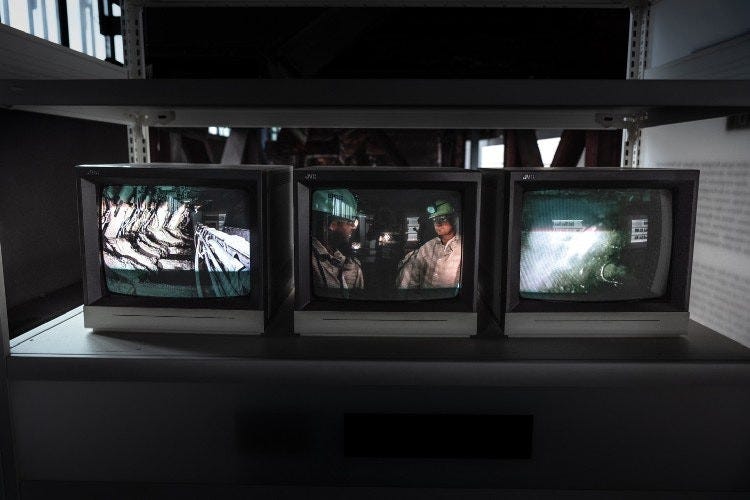
Greetings and welcome to the second edition of Wabi Sabi’s Culture Club! The general idea with this series is that I hype the best media I’ve come across over the past week — books, music, movies, TV — but this week I want to backtrack a bit and talk about the highlights of the year so far. Otherwise I’ll be punishing some amazing work for no worse transgression than coming to my attention slightly before I started the series, and what kind of a writer would that make me? No, what kind of a person? Not the kind who’s just written the piece in front of you, that’s for sure.
So here’s The Best of Early 2021. Enjoy.
BOOKS

Chögyam Trungpa: Shambhala: The Sacred Path of the Warrior (1984)
The first full Trungpa book I’ve read — this excellent greatest hits collection was my introduction to the man — and honestly it was kind of up and down for me. I don’t mind the poetic, free-associative approach in principle, but at times the prose felt kind of rambling even to me, leaving me unsure whether Trungpa was letting his verbiage run away with him or the ideas were just too profound for me to get yet. I think the main problem was that I’d already been introduced to the book’s most eye-opening ideas in the greatest hits collection: imagine hearing The Essential Michael Jackson before getting round to Thriller. On the plus side, those ideas are so powerful they’ve been part of the way I think for a year and a half, and they’ll likely keep surfacing in my posts for years to come.
David Mitchell: Dishonesty is the Second-Best Policy (2019)
The English is just as perfect as you’d expect, and he picks inconsequential things apart in exhaustive detail just as enthusiastically as he does on TV. The surprise for me was the depth of Mitchell’s interest in, and insight into, politics: I came away from the book understanding Brexit — and the British political system in general — a little better than I had before. In fact, I’d love the guy to write a whole book in the vein of the Brexit and decline-of-Western-civilization chapters, which made some of the other sections seem a little thin by comparison.
Ray Bradbury: Fahrenheit 451 (1953)
Wow. Just wow. I’ve always loved Bradbury’s collections of are-they-prose-or-poetry short stories, and while I didn’t fall head over heels for The Martian Chronicles it had moments of real beauty as well. But Fahrenheit 451 is right up there with The Illustrated Man for me. Some of the most evocative descriptions I’ve ever read, and the book’s world of TV “families” who address you by name, in-ear “seashells” that talk you to sleep at night, isolation and inarticulable despair just predicts 2021 too well. This isn’t a book about a world without books, it’s a book about the million ways in which humans become complicit in hollowing out their own spirits.
MUSIC

Regina Spektor: Soviet Kitsch (2003)
I hadn’t heard this all the way through before. A fascinating transition from spiky early Spektor to warm later Spektor: I love the way she flits from tenderness to in-yer-face Noo Yawk attitude from second to second on “Carbon Monoxide” and “Chemo Limo”. Spektor’s one of my favourite songwriters of her generation because she keeps so many things in balance — her songs are catchy enough to be beautiful but weird enough to be interesting; they draw heavily on both classical and pop; the lyrics keep their emotional distance, but there’s so much kindness and pain in that voice.
Lauryn Hill: The Miseducation of Lauryn Hill (1998)
It’s not that I don’t like any recent neo-soul, hip-hop or trap, but when exactly did people decide they didn’t want beats to have this bounce any more? Like Either/Or this is another of those albums that strikes me as a sturdy bridge between the generations, stretching back to the earliest funk and soul on the one hand and pointing the way to all the Janelle Monáes and Lizzos on the other. Bonus points for that wonderfully humane vibe. Life-affirming stuff.
Lily Allen: It’s Not Me, It’s You (2009)
I promise I haven’t been listening to nothing but female songwriters on the Gen X/Y border lately, but I can’t help it if their albums keep making the biggest impression on me. This is exactly the kind of pop I wish there was more of in the world — well-structured, based on genuinely memorable melodies with beginnings, middles and ends, punchy, distinctively sung, filled with snappy one-liners. Frontloaded like so many 2000s albums, but you can’t have everything. The first four songs are as good as pop gets.
MOVIES

Primer (2004)
Good thing I can enjoy movies without fully understanding them. There’s a certain kind of “atmospheric” film I can’t stand — so much so I’m almost allergic to the word — but this one’s a mood movie in the best sense: no lingering shots of people looking out windows that lull you into thinking the story’s deeper than it is, just an unrushed examination of how the best-laid plans often go awry and friendships between very different people sour over time. The movie’s actually very densely and cleverly plotted — I had to fill in the gaps on Wikipedia afterwards — but for me the psychological realism and fragmented, melancholy feel are the main selling points.
The Forty Year Old Version (2020)
Utterly charming. TFYOV is bleakly perceptive about unfulfilled potential (Radha is living under the shadow of a “30 under 30 award” she won almost ten years ago) and the compromises artists have to make to get their work out there (the minute she finally gets to work on a Big Project it starts getting away from her). But it’s not a bleak film, and a lot of the dialogue’s really funny — Radha’s drama students had me laughing out loud several times. Also great: the three-dimensional characterisation; the all-female battle rap scene. I just wish the movie didn’t make such a sharp distinction between uncompromising follow-your-dream art and compromised, worthless art — a few more shades of grey would have been nice.
Letters from Iwo Jima (2006)
I saw Flags of Our Fathers soon after it came out, so it was a bit of a shock to realise I’d only got round to its companion piece 15 years later. Anyway, here’s more proof that even though Clint will always be known first for acting, he’s one of the great directors of our time as well — and also that his political views are slightly more complex than those who called him a straightahead jingoist after American Sniper would like to think. I love the way the script portrays the Japanese forces (all credit to writer Iris Yamashita): avoiding both the “deluded ideologues” and “efficient, unemotional machines” traps, it gives us believable human beings who feel fear, get bored, crack jokes, make stupid mistakes, love their families, weigh up their options and occasionally transcend themselves. Beautiful, meditative filmmaking.
The Trial of the Chicago 7 (2020)
I know Aaron Sorkin’s characters all sound like Aaron Sorkin, but since that makes them all witty, bitchy and hyper-articulate that’s totally fine by me. Also, I may have mentioned that I’m besotted with the period the film covers, which always helps. It’s amazing that the movie’s timing was a coincidence (it was edited a bit in post-production to reflect the events of last summer), because the questions it asks have been at the forefront of America’s left-wing discourse since last May: what’s the most effective way to make your voice heard? Which tactics are OK and which are beyond the pale? Overnight change or gradual, total overhaul or partial reform? Although I’m neither American nor affiliated with a political group I have a lot of respect for the hippy ethos, and I found the film affecting and thought-provoking.
TV

Curb Your Enthusiasm series 10 (2020)
I’ve always adored this show, so imagine my delight when season 10 finally came out — I was so thrilled I only waited a year to see it! The critics seem to have found it a breath of fresh air after series 8–9, but I loved those seasons and found this one a little weaker. Ah well, it’s all Curb and it’s all great. When people used to call Seinfeld a “show about nothing” it tended to obscure the fact that David’s maybe the tightest plotter in the whole business. No-one’s better at introducing 3 or 4 or 5 seemingly disconnected threads then pulling them all together — bam! — at the end of each episode, not to mention pulling all the episode threads together for a grand finale — bam! — at the end of each series. The other thing I love about the show is its Wodehouse-like lightness of touch, which enables the stories to tackle any subject, same as the perpetual twinkle in David’s eye and his surprisingly sweet smile enable him to say anything in real life.
The Haunting of Hill House (2018)
I don’t share my sister’s fascination with horror, but every so often she’ll sit me down and show me something she thinks I need to see — without her I might never have bothered with The Exorcist, Carrie or The Babadook. We saw The Haunting of Bly Manor together last year, so it was companion piece Hill House’s turn this year. I prefer Bly Manor, but this is excellent too. For me the best horror is always about the real-life horrors that terrorise the mind — grief, addiction, remorse, trauma — and the Haunting series is great at making the links between the scary symbols and the characters’ emotional issues explicit without going too on-the-nose with it. It also has real heart, touching on the redemptive power of pain and the human capacity for love rather than simply wallowing in tragedy and malice. Moving.
Kiss Me First (2018)
Just a quick note on this one as I haven’t finished it yet. I’ve no idea how the story will turn out, but I’m enjoying the series so far — interesting Black Mirror-ish premise (what happens when the boundary between virtual reality and actual reality gets compromised?), with its very British grimness leavened with some equally British comic relief. Jonty is a joy of a supporting character, but the Standout Performance Award goes to Simona Brown, who’s also great in that other recent grim-British-show-with-an-intriguing-concept, Behind Her Eyes.





I’ve had Fahrenheit 451 in my Kindle for a while and you’ve definitely sold me on finally getting round to it! And yes, Miseducation is an absolute work of genius and it deserves all the accolades it got Lauryn Hill!